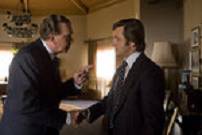|
|
||||
|
|
by Jeffrey Chen  Frost/Nixon screenwriter Peter Morgan is out to humanize powerful authority figures, finding drama in their battle of wills against public perception and history's tendency to pigeonhole. In other words, since the public eye often simplifies such personas into two-dimensional character profiles, Morgan appears interested in giving them back their third dimension, their complexity. In co-writing The Last King of Scotland, he found a way to make the insane Idi Amin recognizably human -- not necessarily redeeming, just human. His masterpiece may have been The Queen, where Queen Elizabeth II faced a public relations dilemma that challenged her traditions and pride. Like all national leaders, these individuals are easy to criticize and vilify, and we might forget that they're people with normal traits who happen to be in positions of extraordinary duress. It's not that they necessarily deserve sympathy, but they do deserve to be understood as people. With Frost/Nixon, former president Richard Nixon (Frank Langella) can be added to the list. The movie, directed by Ron Howard, focuses on the events leading up to and including the televised interview Nixon gave to British talk show host David Frost (Michael Sheen) in 1977, three years after the ex-president's resignation. Though the movie is set up to be essentially a one-on-one confrontation which shows the preparations of both sides, it's Nixon who's given the most depth and made to be the more interesting character. Frost is depicted as a lightweight showman who sees Nixon as another fame-building opportunity, so his half of the story shows him developing a journalist's integrity. But Nixon comes fresh off a humiliating resignation -- given presidential pardon by his successor Gerald Ford, he can not be legally pursued to answer for Watergate and hasn't spoken of it since. With the apparently non-threatening Frost granting him an audience (and a hefty check to go along with it), Nixon seizes the chance to give his side of the story and hopefully repair some of his reputation. Frankly, there isn't too much more to Frost/Nixon than that. It's quite straightforward -- Howard doesn't do anything fancy, and Morgan's screenplay isn't as complex or intriguing as The Queen. They give us an old-fashioned showdown, where we get to know each character and we understand how to sympathize with each of them. Because the interview lasts over a few days, we're even given "rounds" -- for example, after the first day of interview, Nixon clearly overmatches Frost and effectively wins "Round 1," thus sending Frost's team scrambling for new strategy on how to corner him into the confession they feel the public deserves for Watergate. And because viewers get to know what the main players are like, the movie-savvy among them can see where it's going, with Frost gaining a spine and Nixon finally facing his burden of guilt. At this point, one must give recognition to Langella for his performance, for without it Frost/Nixon would have no center, no meat. His irascible Nixon has visible layers of guilt, rage, pride, awkwardness, and pure political professionalism. Langella gives Nixon a chance at audience sympathy -- for everything you know and possibly hate about the man, you can see, through the performance, that third dimension. Sheen matches Langella step-for-step performance-wise, but frankly Frost is a less interesting character. That doesn't diminish Sheen's performance though, and one must imagine Howard simply got out of his and Langella's way -- after all, the two main actors have been playing these very same roles for some time in London and on Broadway. Their comfort with these parts translates easily to the screen. Unfortunately, overall the acting comes across as something of a mixed bag, because for some reason many of the supporting parts feel either overacted or buffoonish. Kevin Bacon as Nixon's right-hand man does a decent job, but in Frost's corner, Oliver Platt and Sam Rockwell act as comic relief and seem too silly. And Toby Jones in a small part is, to put it nicely, distracting. But it's Nixon who ends up with some sense of tragedy attached to him, and perhaps that's all the ghost of the real Richard Nixon could ask for. He may never have history look past his giant misdeeds to play up his accomplishments, and perhaps that's fair. But it's also fair for him to get a Frost/Nixon treatment -- not an apology for the man, just the reminder that he was but a man. (Released by Universal Pictures and rated "R" for some language.) Review also posted at www.windowtothemovies.com |
||
|
© 2025 - ReelTalk Movie Reviews Website designed by Dot Pitch Studios, LLC |



